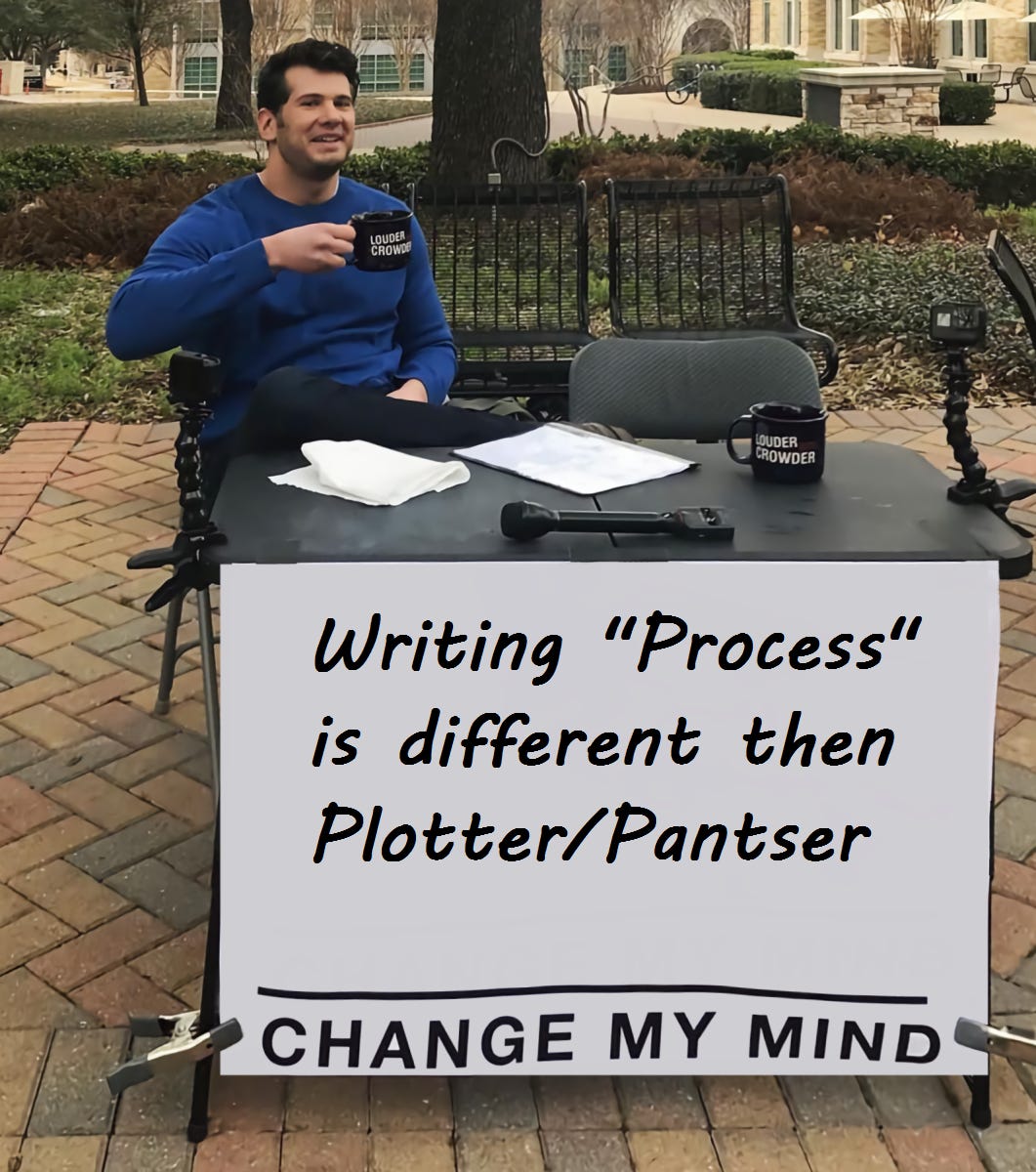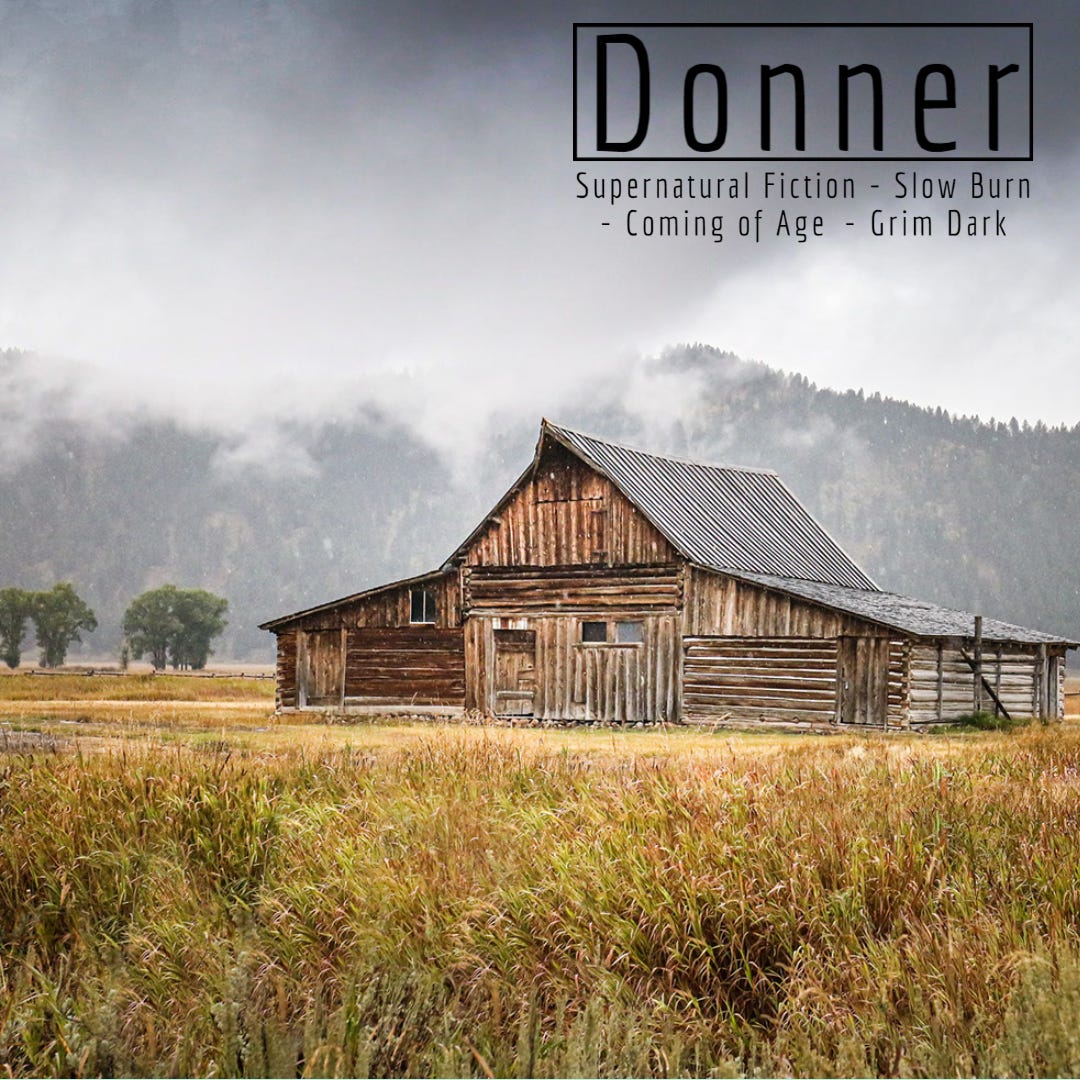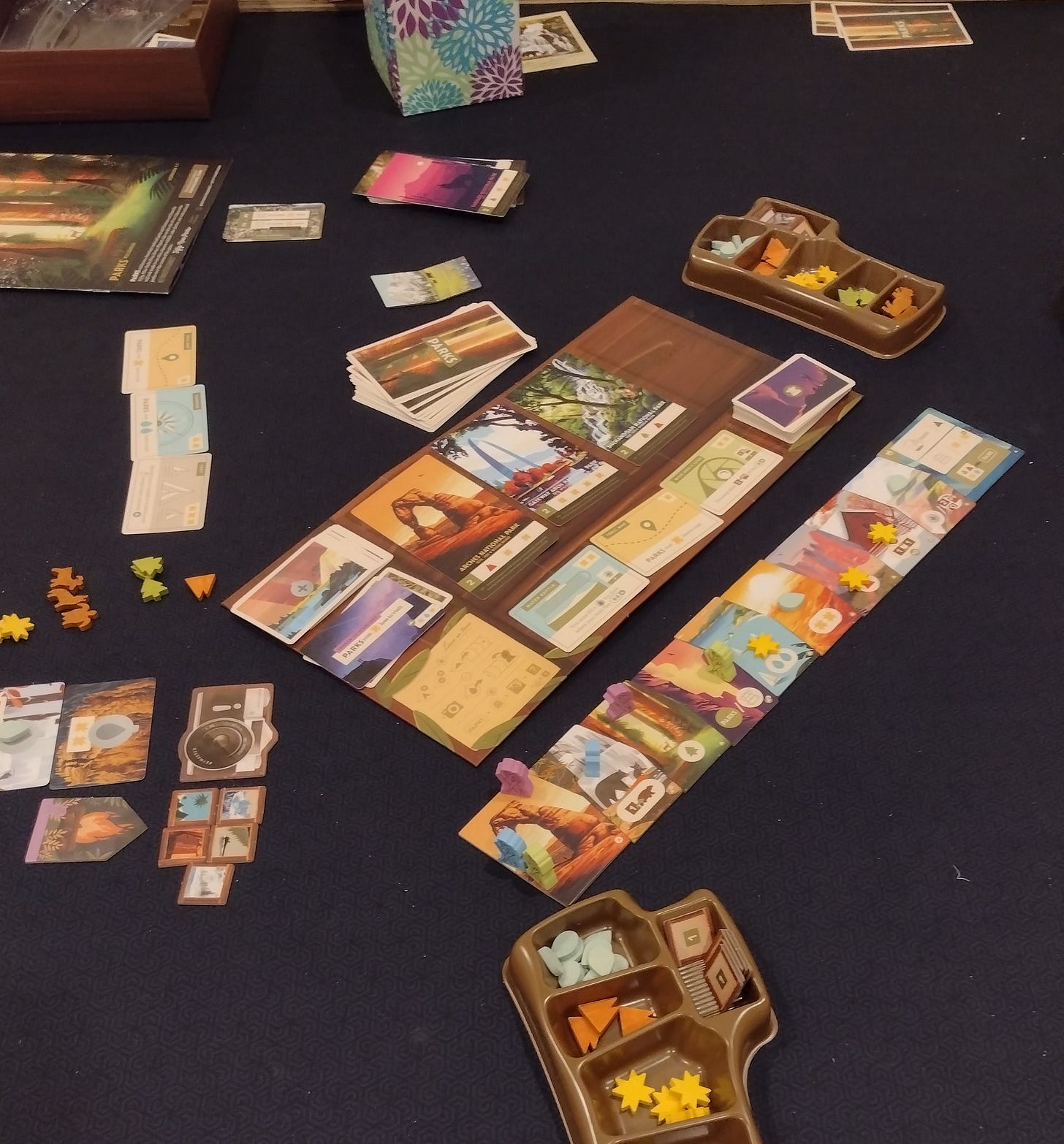Let's talk process
Oh, excitement!
Announcement:
I have decided to launch extra content on Substack, the platform this newsletter is provided by. This content is totally optional and you will not receive any notice about it via default email subscription settings. You can sign-up to receive the additional emails, or navigate to my sub-stack page and read the post ad-hoc. It’s relevant to today’s topic, so let’s dive in.
On the writing process…
To talk about this we have to define what “process” is, as it's subjective and every writer will tell you something different. Often when this topic comes up with writers, we hear the common terms of Plotter or Pantser. Sometimes these terms are swapped with Architect and Gardener, or even more obscure terms like Jedi and Sith…
Plotter (Architect) are the writers that tend to have a plan, outlining constantly and anxiously until every detail is written out. Don’t worry, none of those details are the actual book. If you have ever taken a class that had a segment of story writing, they would often talk on three or five act structure, or “hero’s journey,” which they then make you plan out your story within these beats. That is a Plotter. A famous example is Brandon Sanderson, who self proclaims a “One draft” approach to his writing in some of his own blog posts.

Pantsers (Gardener) are the writers that will sit down at a blank page, get up for coffee, look at the page, go watch TV, then finally when the muse shows up, write for hours. These people like to make anything up on the fly, floating any way the wind blows. I bet they were the kids that would pick up the shape puzzle and just started trying to fit the square block into every shape until it finally fit. Some famous examples that a few Google searches provided are Margaret Atwood, Pierce Brown and Stephen King.
My friends and family would say I am a plotter, and they could not be more wrong. I am totally a Pantser chaos creature. I lean this way as I see my stories as something I am getting a private view into. Most of the time it’s the character telling me, other times I am an ephemeral spectator gripped to write what is happening in that moment. It’s as much the character’s story as it is mine. Sometimes they want to tell me, other times I have to pull it out of them, and sometimes they don’t want to talk or even lie to me. Wow, reading this back, I sound like I have a lot of voices in my head, and maybe I do.
Now that my few readers are scratching their heads trying to rationalize how I am a Pantser, let’s blow everyone’s mind. None of this is Process. You're welcome to try to convince me otherwise.
So what is “process”? And how are you not a plotter, yet have clinically diagnosed crippling OCD?
So let’s be clear, plotters and pantsers are who you are when you put pen to paper. Period, full stop. Granted, let's delete that period and pass “Go” to gain $200. I could go on and on, I think this ‘writing approach’ changes as you change and what you're writing, and all these other factors that comprise each writing project. Also, let’s shove the idea of Plantser (Hybrid) out of view to stay on topic.
“Process” is how you iterate from draft to draft, how you go from the idea to a completed project. It’s the connective tissue of your ‘writing approach’ of plotter or pantser, that every writer has even if they don’t see it. This is where I let the OCD run wild. If labeled, my process would be a heavyweight champ coming in at a whopping 29 page flowchart.
But what does this look like? Well, I don’t want to get lost in details, like all my sub drafts and minor notes for myself, but below is a high level flowchart of my “process”:
Inspiration
(normally in the form of a scene that comes to my mind first.)
\/
Rough Draft
(this is very rough, and I am not always worried about connecting scenes, writing everything out or even internal story logic. I just write like any pantser would; wild, free, and running in the woods.)
\/
First Draft
(this is normally just filling in the gaps, reading what I have, then totally rewriting bits. I normally try not to do any edits to stay focused.)
\/
Second Draft
(I normally try to give my work some space for a time, then come back, read and answer a few very abstract questions. These challenge me and the piece, which then act as guides to completing my vision. I will go back and clean up anything that was noted.)
\/
Third Draft
(So a lot happens between this and the prior draft, but the big things are I fully dive into my high-level story edits with Developmental edits, I work with Alpha readers and my writing group for feedback, then go into scene level edits.)
\/
Fourth Draft
(Another big revision process between drafts, but most boils down to a lot of back and forth over line level edits.)
\/
Fifth Draft
(a lot of fine tuning and “oh shit, I need to go back because this is totally broken and I cannot believe I did not see this before.”)
\/
Sixth Draft
(This is where it comes to Beta Readers to catch any last things, as well as make sure a lot of the fine details come through as intended.
\/
Seventh Draft
(my final pass and wrap up of the piece)
While this is a lot, it’s very useful for me to make sure I am completing the correct edits at the right time and acting as a guide to keep pushing me forward. I have seen so many creatives’ in my life get stuck on “perfect” and it’s a pit trap I am totally susceptible to with my OCD, personal fears of being good enough and reaching to be the best I can. But this “process” helps me acknowledge where the piece is at, and accept that this is where my skills are as a writer and that’s okay. It’s an acknowledgment that the piece/project I did the best that I can currently do, that it’s at an end and time to release it out to see if others want to read it. I have learned a lot of don’t self-reject because of not meeting my “perfect”, and to keep moving on regardless of what that speed might be. Art is beautiful because of imperfections, and those that it reflects back at us as observers. We are all learning, growing, and changing beings.
Even still, Process I believe is only meant to be a guide that changes from project to project, and gets streamlined as you become a better writer.
So I will leave this with one final thought for my other creatives’ out there. What is your process?
But where does the announcement fall in this?
Well, for those few of you I have baited this far, you are most likely like me. You love the peek behind the curtain, the “making of '' videos, the documentaries about how those hit stories were made, all things about the process. I certainly do. I watched the “making of” videos of Lord of the Rings trilogies more times than I can count. So that is my announcement, I will be essentially starting a “developer’s blog” for my writing.
This “development blog” space will be a “weekly highlight” post about how my writing went that session and/or week. These posts will be high level, which might make them feel vague or abstract at times, unfortunately this will be intentional until I can find a good balance. This is because publishing houses count “blog” posts and ”Newsletters” as publishing, which can null and void acceptances of work. I am also assuming in this blog I will sometimes go on side tangents and in-depth talks about my process. However, some weeks might be quick summaries of a few sentences.
Please note, you will not get these as emails by default. You would have to go to my Substack page and read as you want. However, there is a way to make these become emails for you. Honestly, I recommend most people don’t sign up for the extra email, because I don’t want my readers to get newsletter/content fatigue. But for those of you that don’t care, click the below button and It should ask you to subscribe, but this time it will be for email content for “Branching the Broca”.
The past month in writing?
I have completed some Drabbles I have been working on the last few months. Drabbles, so far, I’ve found it’s best to have little process structure and maximum pantsing with the writing of each draft. Each session rapid iterations with sizable gaps between working on them for clarity. With the writing being a read of the past draft then opening a new document to rewrite.
I have a short story that I have been working on for about six months called “Donner”, that I am quite excited about. It’s gone through beta readers and someone I got to do a final grammar pass. Now I am packaging it up to send out to a few magazines these next months.
I am still going through Developmental edits for my novel that I have codenamed “Wildwood”. I believe that taking time to get Developmental edits right is critical, otherwise you can spend a lot of time redoing stuff again and again. Overall I am very excited, as these characters always come knocking and telling me bits and pieces of what happened in their lives. They have turned into very strong voices in my head, and sometimes will not leave me alone. However, while I feel this piece has legs and others would love to see it, I am under no illusion that novels can take years from idea to printed page. Even then, most novelists write a half a dozen or more works that are duds before a debut novel is accepted. This is only my third novel ever, so we shall see.
What have I been consuming?
So I am a big believer that reading is an important part of being a writer, something to round yourself out. From knowing the market, the learning opportunities it presents, supporting others and just relaxing. I do believe those values can expand out of the space into other media like TV shows, podcasts, theater, concept albums, etc. But the written word is the easiest to relate to and learn from as an aspiring writer. That being said, while my goal is to read 42 books this year, I am behind with only 20 books to date. While it's not a deal breaker to make or break this target, it’s not only about what I can take away as an author but how it offers a space to relax and connect with those around me. It opens this connection with those of you that read this newsletter, to learn who I am as a reader and how that affects my writing.
So that all being said, I barely read or listened to anything the past month. Unabridged audio books are fair game. Sometimes it is all we can fit in with the rest of the responsibilities of our life. So unfortunately nothing to talk about that is fresh, but let’s dive into one of the most recent things I have finished reading.
Children of Time by Adrian Tchaikovsky -SPIDERS! This book took me a whole year to read due to all the spiders, but the fact I finished it, is a testament to how good it is. So this book runs with the idea of what if advanced humanity did play god and it went horribly wrong. We follow thousands of years of the human race as it fights against its death-throes, while following the birth of sentient spiders and how this is juxtaposed against humanity's own path. A lot of creative ideas are explored here on so many levels with deep theming and powerful characters. I recommend to anyone that loves Sic-fiction, something different, open to philosophical debates, but is not opposed to reading a story that makes you think about the words behind the story.
Outside of writing…
Life has been busy, with my busy season of work and a lot of life events, planned and unplanned, that have kept me stumbling the past year. But a new normal has started to settle and form. Hiking and going out has been limited because of everything, but board games have been on the rise. Here is a picture of a game called Parks. It’s a fun little game about going down a trail, taking pictures and earning resources to visit national parks throughout the US. Which somehow only one person is allowed to go to in this game.
Thank you so much for reading and I hope you stick around for next month’s letter.
Thank you,
Jakob Wild
If you enjoyed this, and you have friends you think would also enjoy, please share this newsletter or my Substack!
If you are reading this via my website, or the Substack archive, and wish to remain updated on the latest, please subscribe!
Subscribed





Great article! I always feel that, when people get into the details of plotter vs panther, they may realize they're a little bit of both, with some preference of one over the other.
For myself, I'm a bit of a one-draft wonder, at least with short stories. My three-years-in-the-making novel would beg to differ though.
It's always interesting to hear different processes. Even though it's highly subjective, it could help to fine tune your own process here and there--for me it has.
Can't wait to see your final drafts!